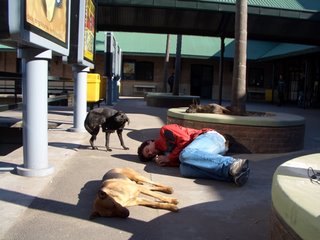The Café of Babel
 On this note, I should mention another category as well: words and phrases that are used in a different context or not at all in English: for example, after beach, flash and SMS.
On this note, I should mention another category as well: words and phrases that are used in a different context or not at all in English: for example, after beach, flash and SMS.Now, before you accuse me of being a linguistic purist, à l'Académie Française, let me point out that 1) I naturally have an unfair advantage in this game and 2) there are certain foreign words – much like grapes when transplanted to a different climate – that acquire a richness in their new environment. For example, though I find it silly to say fulltime instead of a tiempo completo, there is no one simple translation for the particularly Argentine expression a full, which can mean totally, all out, completely, full, nuts, etc. Full, incidentally, didn’t even make it into the article, probably because it’s so commonly used.
Additionally, we English speakers have long been guilty of this, at least since 1066 and probably before. In more recent history, H.L. Mencken dedicates a big chunk of his The American Language (1921) to presenting foreign borrowings as evidence that Americans have bettered the British tongue.
Then again, if you ever catch me saying “Let’s have a little après-ski,” please shoot me.
Anyway, so I was sitting in this rather fashion café in Palermo when a middle-aged woman and her father sat down a few tables away from me. After squinting at the chalkboard at the other end of the restaurant, the woman announced:
“I’m going to order a frappuccino.”
“A what?” asked her father.
“A frappuccino,” she replied. “You know, it’s like a cappuccino. It’s like a mocha, but a mocha has chocolate.”
Her father looked puzzled.
“They serve them at Starbucks. Star-bucks.”
The poor old man looked even more confused.
“It’s a chain of cafés in the United States. It’s named after a character in Moby Dick.”
The name of the book seemed to ring a bell, but, still, the sidestepping definition of frappuccino satisfied neither the old man nor me.
Finally, the waitress approached and he asked for a clearer explanation.
“Es como un cappuccino, pero está frozen,” the waitress said.
The father ordered a cappuccino, his daughter a frappuccino, which is like a little hooded man, but it’s congelado.
*The photo of Claxon Bajadi seen above was taken in Punta del Este, Uruguay. Uruguay, according to the CIA factbook, is also a Spanish-speaking country. And the CIA never makes mistakes.



5 Comments:
"Words strain,
Crack and sometimes break, under the burden,
Under the tension, slip, slide, perish,
Decay with imprecision, will not stay in place,
Will not stay still. Shrieking voices
Scoling, mocking, or merely chattering,
Always assail them."
A full, Eliot, a full!!!
USO PALABRAS EN INGLÉS, PERO COMO BIEN DICE UD. RESIGNIFICADAS.
Igual por principio las odio, al igual que odio las fechas que importamos de Uds.: Haloween, San Valentín, Decorados de navidad con nieve!!!( cuando acá nos cagamos de calor!!!!)
Saludos inquilino
Did you ask the store how they came up with that name? The store in BA, Lady Stork, the name really irritates me for some reason.
There is a store here in Vancouver called Inertia (Asian housewares and design) and I had to ask, "they wanted to give a feeling of energy and movement"....?!
La exclamación de Rip Torn en "Blazing Saddles" se podría aplicar a nuestro Eliot, ese gran británicoparlante trucho: “you use yer tongue purdier than a twenty-dollar whore.” Qué linda la cita. No obstante, como comenta la casta y devota Santamarina, las palabras no son inocentes ni impotentes; si se quiebran y se erosionan, actúan con una fuerza recíproca sobre los que las usan, generalmente sin que el hablante se dé cuenta. Mis queridos landlords, je vous remercie tous les deux por su hospitalidad y sus comentarios.
And as far as the store in Punta del Este, I didn’t bother to ask. Then again, given the astonishing quantity of ads for plastic surgery, I can hazard a guess.
I think the incorporation of English words, specifically into Argentine spanish is referred to as Casteyanki, please forgive my spellings.
I also must say that 'a full' is one of my favorite Casteyanki sayings, especially when accompanied by the appropriate hand gesture, which is punching sideways into the air with a clenched fist, albeit sideways. Scribble on... and I look forward to crossing paths with you some day here in BsAs.
Post a Comment
<< Home